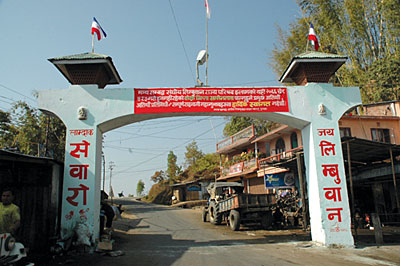 |
Local leaders still claim the May 28 deadline for the constitution can be met, but the people are sceptical. The Limbuwan National Federal Democratic Forum and the Federal Limbuwan Council of Ilam have been working on programs to protest the anticipated failure.
Dharma Gautam, a civil society member, blames the political parties for the delay. "Political parties may come up with a constitution but it had better be one that is acceptable to all," he says. He's doubtful however that the parties will resolve contentious issues any time soon. "They will realise the significance only after the country enters armed conflict, resulting in economic crisis and ultimately foreign intervention."
Bheshraj Acharya of the Nepali Congress has been pinning his hopes on leaders that an agreement will be reached soon, particularly on two issues: state restructuring and forms of governance. He is against the idea of a concise constitution. "The constitution should be written no matter what it takes," he says, "or else we should hand over power to the army or be ready to face civil war."
UML's Mahesh Basnet considers the Maoists the main obstacle to writing the constitution. Instead of focusing on constitution writing, he feels, they launched protests in the name of civilian supremacy and an anti-Indian movement, and pelted stones or showed black flags to ministers. "They want to create instability and reap benefit from it," he says.
But president of the Maoist-affiliated Limbuwan Liberation Front, Shree Jabegu, maintains it is wrong to say the Maoists have obstructed the constitution-writing process. "The Maoists raised the issue of the Constituent Assembly due to which they won the elections. How can the Maoists be against the CA?"
Ilam president of the Nepal Bar Association Appellate Unit, Madan Khadka, warns there is not enough time to follow all the procedures in endorsing the new constitution. He thinks the political parties should first agree on the forms of governance and the federal model to move the process along.
Some local leaders and intellectuals are still hopeful, but the public is not. Bijay Rai, who runs a hotel in Pokhareli Bus Park, Ilam, is worried about a possible conflict. "We were hoping the new constitution would put an end to conflict in the future but it does not seem to be the case as the political parties are engaged in power games,"
he says.
Bablu Pariya, a tailor in Nikunja Path, adds, "The new constitution was supposed to end all kinds of bandhs and strikes to create an environment conducive for working class people, but now it seems it cannot be written on time."
While CA business is stuck debating the federal model and forms of governance, half a dozen parties and organisations in the eastern hills have been haggling over the proposed territory of Limbuwan state.
Limbuwan has been claiming Jhapa, Morang and Sunsari, which in the draft proposal of the Committee on State Restructuring and Sharing of State Power fall under another province. Rai and Limbu fronts are fighting over Khambuwan and Limbuwan territory. The Kirat Workers' Party and the Khambuwan National Front have been saying the Limbuwan and Khambuwan regions should be jointly called Kirant Province.
Dharma Gautam says this is the result of the hasty decisions of the political parties, which did not consider economic viability, geographic accessibility, social and historical backgrounds in determining provinces.
Shree Jabegu, meanwhile, rules out ethnic discrimination in Limbuwan state. "There is no need to be scared of ethnic slogans. We all are Nepalis first. Everyone will have equal rights irrespective of the community they represent and the place they reside in," he says.
READ ALSO:
Constitution 2010, Nepali Times coverage of issues related to writing the new constitution


